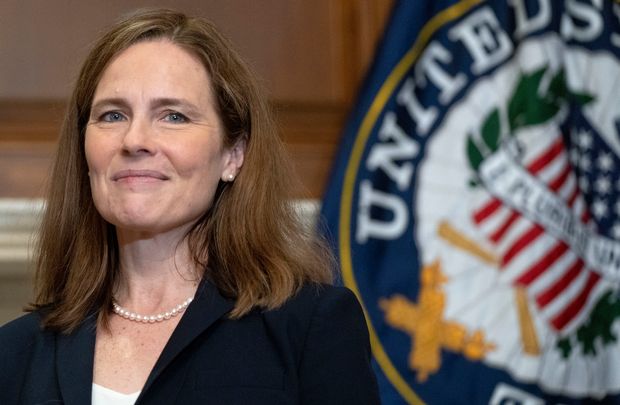
Newly confirmed Supreme Court Justice Judge Amy Coney Barrett.
Getty Images
The Senate voted Monday evening to confirm Judge Amy Coney Barrett to the Supreme Court, overcoming fierce partisan opposition to the vote and marking the third justice President Donald Trump has appointed to the nation’s highest court in just four years.
The vote was 52-48, along partisan lines, with Republican Sen. Susan Collins of Maine the only Republican to cross lines. Alaska’s Lisa Murkowski, a Republican, had opposed a motion to end debate on the nominee, but supported her nomination at the final vote.
“How fortunate for our country that the Senate just advanced the most qualified nominees for judicial service we’ve seen in our lifetimes,” said Senate Majority Leader Mitch McConnell of Kentucky, earlier Monday. “Barrett’s] intellectual brilliance is unquestioned. Her command of the law is remarkable. Her integrity is beyond reproach.”
Barrett’s ascnension to the court could have immediate and consequential impact on policy debates across the country. Democrats centered their opposition to Barrett on a case to be heard by the court on Nov. 10, California v. Texas, in which Republican governors and state attorneys general have argued the Affordable Care Act is unconstitutional and should be overturned, and with it with it popular provisions like those requiring health insurance companies to cover Americans with pre-existing conditions.
“Judge Barrett has argued that Justice Roberts got it wrong when he upheld the Affordable Care Act,” Senate Minority Leader Chuck Schumer, a New York Democrat, said minutes before the vote. “That’s the great and terrible truth about this nomination. Judge Barrett holds far-right views well outside the American mainstream, and those views matter to the vast majority of Americans.”
With Barrett now the sixth Republican-appointed justice to sit on the Supreme Court out of nine, Democrats argue that she will be a vote to overturn the ACA, though Republican senators have argued that chances the entire law will be struck from the books are low.
On Nov. 4, the court will hear another contentious suit brought by a Catholic foster-care agency against the City of Philadelphia, which stopped contracting with the organization because it has refused to place children in households with same-sex parents, contrary to the city’s nondiscrimination policy. Catholic Social Services is asking the court to force the city to continue to contract with it on religious-freedom grounds.
The confirmation came after weeks of fierce protests by Democrats, who argued that the Senate should not have considered Barrett’s nomination in the middle of a presidential election. In March 2016, Senate Republicans refused to consider President Barack Obama’s nominee to the court, Merrick Garland, on the grounds that it was an election year, saying citizens, through their presidential vote, should have a say on the pick.
Senate Judiciary Committee Chairman Lindsey Graham said as recently as 2018 that he would not consider any Supreme Court nomination in an election year, but he and Senate Republicans seized the opportunity replace the late Justice Ruth Bader Ginsburg, a progressive icon, with a conservative jurist, after her Sept. 18 death.
During confirmation hearings, Republicans chose to focus on Barrett’s qualifications for the Supreme Court, citing the American Bar Association, which rated her as “well qualified” to sit on the nation’s highest court as well as testimonies from liberal lawyers like Harvard law professor Noah Feldman, who called her “brilliant and conscientious” and that she “deserved” to be on the court.
Trump said Monday that the confirmation will be followed by an outdoor celebration at the White House, telling reporters at Lehigh Valley International Airport before a campaign event in Allentown, Penn., that it would not be a large event, “just a very nice event.”
The White House has received criticism for holding outdoor and indoor celebrations to announce Barrett’s nomination on Sept. 26 that experts suggested was as a so-called “super-spreader” event that led to numerous high-profile Republicans and White House staff to contract COVID-19.
Meanwhile, several staff surrounding Vice President Mike Pence have recently tested positive for the disease, though he has continued to campaign after testing negative for coronavirus.











